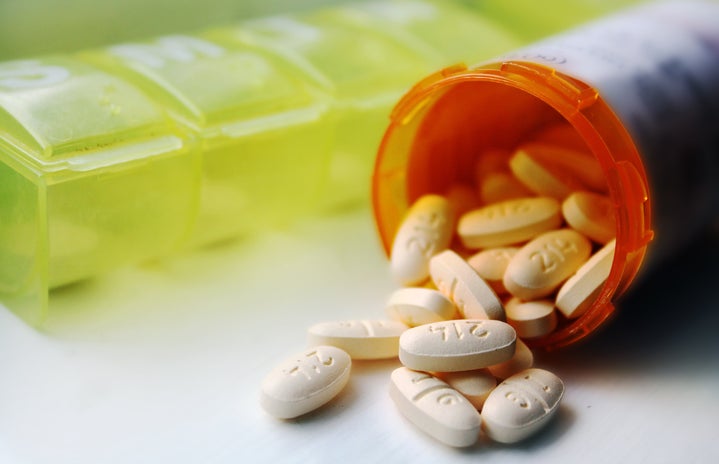*Disclaimer: This is based on my personal experience with medication. Nothing in this article should be taken as medical advice. If you have questions about mental health medication, talk to your doctor about what may be right for you.*
In the summer of 2022, I made the decision to ask my doctor about mental health medication. I had been struggling for years with anxiety and depression, and the load was becoming too much to handle. However, this decision was difficult for me. I had a lot of stigmas built up around mental health medications and people who took them.
I think everyone has a little bit of stigma toward these medications because we have trouble understanding them. All we know is that they alter the mind, which can be so scary. What if it changes me? What if I become numb? The unknown is terrifying. But knowing how much I was struggling, and seeing how well my little sister was doing with her medication, I decided it was time to start thinking about it.
I worked through my anxiety about mental health medication in therapy. It took some time, but I recentered my feelings about them to focus on their possible benefits. Instead of concentrating on the negatives that may or may not be, I turned my attention to how much better I would feel if they worked. I would have less anxiety, more manageable depression, increased motivation, and better focus. All of the things that I desperately needed.
The next step was to talk to my doctor. She gave me two screening tests, one for anxiety and one for depression. Upon completion, she diagnosed me with moderate major depression and generalized anxiety disorder. It was the first time I had been honest about my symptoms during those screenings. In the past, I was always afraid that if I was honest, I would be put on medication when I didn’t want to be. But it was time. It was too much for me to handle on my own and I finally asked for help.
My doctor immediately started me on 25 milligrams of Sertraline, a generic form of Zoloft. I was nervous because I knew the adjustment period for these medicines could be rough, but I also knew that once I got through it, the benefits could be infinite. During the first two weeks, I had some undesirable symptoms. My heart would race, I was jitterier than normal, the effects of caffeine were dramatically heightened, and I had some weird appetite changes. I was a little concerned some of those symptoms would not go away once my body adjusted to the medication.
After the two-week adjustment period, I noticed a huge change in my mood. I was more outgoing, more energetic, and generally happier. I felt like a carefree little kid again. I was able to focus so much better on my school work, my sleep schedule leveled out, and I started to build more self-confidence. I even started wearing crazy colors again! It was like I had finally unlocked who I really was, underneath all of the mental illness. I wasn’t myself, but I am now.
I am so grateful for the opportunity to start anti-depressants. It’s definitely not for everyone, but it was the right choice for me. I started socializing more regularly, taking on new opportunities, and spending more time on self-care. I discovered a love of cooking, improved my relationship with food, and started taking better care of myself. I even joined a new club. It was a complete turnaround after barely being able to get out of bed or brush my teeth most days. I was finding myself.
Since starting this medication, I have had to increase my dosage to 50 milligrams. I started to notice some of my more severe symptoms coming back and I reached out to my doctor to see what could be done. Needing adjustments is normal. Over time, your body gets used to the medication and it may lose its effect, but since I started at such a low dose, there was room to adjust as I needed. So far, things have been good. The symptoms that had popped up went away and I’ve gotten back to the best version of myself. I still go to therapy regularly, as I definitely still have things I need to work on. But the symptoms of my mental illnesses are so much more manageable. I can sense a panic attack coming and be proactive. It is easier to recognize when I need a break and I feel more at ease communicating that to other people.
I do not regret my decision to try out anti-depressants. They have improved my life drastically. I was afraid that they would change me, but I never stopped to consider that the change could be a good thing. I only wish I had asked for help sooner because I could have experienced these benefits so much earlier.
“You deserve help, you deserve to feel better.”
I share my story in hopes that others who may be struggling with mental illness and stigma might feel empowered to speak up and ask for help. You are not alone and you are not a burden for seeking out help. Whether it be medication, therapy, or just support from a friend, you deserve help, you deserve to feel better.
If you or someone you know is seeking help for mental health concerns, visit the National Alliance on Mental Illness (NAMI) website, or call 1-800-950-NAMI(6264). For confidential treatment referrals, visit the Substance Abuse and Mental Health Services Administration (SAMHSA) website, or call the National Helpline at 1-800-662-HELP(4357). In an emergency, contact the National Suicide Prevention Lifeline at 1-800-273-TALK(8255) or call 911.



